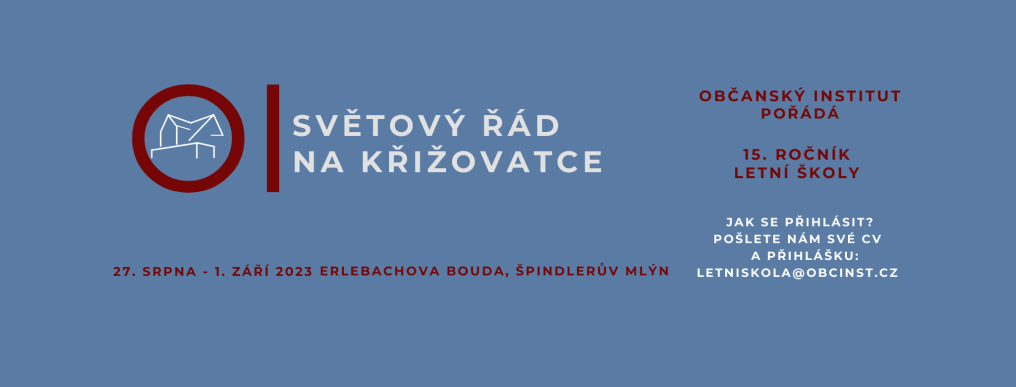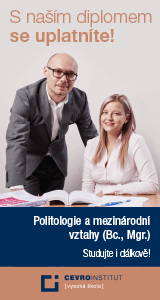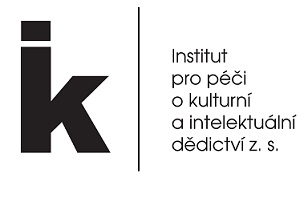The Civic Institute completed another year of activities in its decade-long existence, by the same token closing one big chapter and opening a new one. A year ago we entered into an agreement on cooperation with the emerging Educational Initiative for Central and Eastern Europe based in Vienna. Degree of cooperation has been so high that it has become necessary to make changes in the Civic Institute Board of Directors. The newly constituted Board is composed of Pavel Bratinka (Chairman), P. Marcel Guarnizo, Damian von Stauffenberg, Julian Heron, Christopher Briggs and Kathy Super. These changes can be seen as a herald of increased funding of programs organized by the Civic Institute, including potential expansion thereof. Close cooperation with the Vienna-based institute will enable the Civic Institute to spread out its operation beyond the borders of the Czech Republic, whilst preserving the forms of its existing activities as well as its distinctly conservative orientation.
THE READING ROOM AND PUBLISHING ACTIVITIES
Those who wish to gain a broad outlook of the world of social sciences will find the Civic Institute Reading Room an ideal place to explore an ever increasing number of quality books, magazines and other printed material. Ever since it was established the Civic Institute has endeavored to build up a representative collection of valuable books covering the areas of politics, social ethics, economics, law, and political philosophy. The Reading Room is widely used by students majoring in social science at the Charles University, as well as many other visitors who may not be studying social sciences in college but want to gain a better insight into the subject. The Reading Room has also served as a source of information and data for numerous theses and dissertations.
Publication of regular monthly CI Bulletin continued in 2002 by the following twelve issues:
No. 125
Otto von Habsburg: The Right to Europe
No. 126
José Pinera: Liberating Workers: The World Pension Revolution
No. 127
Irvin M. Stelzer: Is Europe a Threat?
No. 128
Georges-Armand Masson: Soliveau, or The Ideal Member of Parliament
No. 129
Brian C. Anderson: Bertrand de Jouvenel´s Melancholy Liberalism
No. 130
Gertrude Himmelfarb: The Idea of Compassion: The British vs. The French Enlightenment
No. 131
Thomas Fleming: Abuse Your Illusions
No. 132
Roger Scruton: The Idea of a University
No. 133
Russell Kirk: A Dispassionate Assessment of Libertarians
No. 134
Anthony Scholefield: The Death of Europe
No. 135
Fareed Zakaria: Culture is Destiny
No. 136
James Kalb: What is the EU?
As a special tribute to Michaela Freiová, at the occasion of an important jubilee in her life, the Civic Institute published a selection of her articles from pre-1989 samizdat editions as well as post-1989 newspapers and magazines, under the title Life as Service.
CONFERENCES, SEMINARS, LECTURES
Any ?devotee? of conservative thinking in Bohemia and Moravia is familiar with the fundamental work of Edmund Burke dealing with the French Revolution. But who would have thought that one of the first critical texts on the French Revolution was written by a Czech farmer and scribe František J. Vavák? In October, the Civic Institute invited David Hanák of Euroskeptik to present a paper on the subject of F. J. Vavák – The First Czech Conservative.
The annual three-day workshop Christian Perspective and Free Society was organized in April in Brno, in cooperation with the Conservative Party, as a forum to explore and discuss fundamental issues of social ethics and political philosophy, addressed by Michaela Freiová, Jiøí Fuchs, Roman Joch and Michal Semín.
In cooperation with the Liberal Institute, the Civic Institute organized a one-day seminar under the title Capitalism, Morality and Religion. Whereas capitalism and its practical impacts upon the life of the family and the civic society ranks among basic topics in the philosophical debate at the political right, the relationship between religion with its ethical imperatives on the one hand, and institutions of capitalism on the other, has in the Czech political climate been overlooked and ideologically manipulated. An attempt to rectify the situation was made by Michaela Freiová and Michal Semín on behalf of CI, and Jiøí Schwarz and Ján Pavlík on behalf of LI.
In October, supporters of the Civic Institute got together at Erlebach Chalet in the Giant Mountains for a three-day workshop devoted to another important subject: Legitimacy of Current Political Institutions. Participants focused on issues relating to the trend whereby liberal democracy has been increasingly losing its religious and ethical contents, in the context of domestic as well as international politics. The seminar was addressed by Petr Bahník (Lipový køíž – Association for Cultural Identity), Marek Benda (former Member of the Chamber of Deputies), Michaela Freiová, David Hanák (Euroskeptik), Roman Joch, Radomír Malý (Theological Faculty of South-Bohemia University), Michal Semín, Josef Štogr (Regula Pragensis) and Stanislav Vejvar (Orel).
In March, the Civic Institute organized a one-day seminar for conscripts in Kromìøíž garrison on the subject of Social Consequences of Atheism and Totalitarianism, addressed by Roman Joch, Michaela Freiová and Michal Semín.
Regarding the upcoming referendum on accession of the Czech Republic to the EU, the Civic Instituted hosted in November a seminar Experience of the Referendum in Ireland. Invitees included participants in the campaign concerning ratification of the Treaty of Nice – Tomáš Jirsa and David Rýc of Young Conservatives.
In February, the Civic Institute organized a conference 60 Years After Wansee, in remembrance of the fatal decision aimed at extermination of Jews. The conference was addressed by Oren Anolik (Embassy of the State of Israel in Prague), Jan Horník (editor of Babylon magazine), Miroslav Kryl (North-Bohemia University), Zbynìk Petráèek (Respekt weekly), Alexander Tomský (publishing house Academia).
ECONOMIC STATEMENT
(January 1, 2002 – December 31, 2002, in Czech crowns)
Revenue:
Balance as on January 1, 2001 713,823,25
Gifts 1,686,068.87
Czech individuals65,950.00
Czech Institutions780,300.00
Foreign Institutions839,818.87
Book sales 24,280.70
Interest yield 1,651.11
Total 2,425,823.93
Expenditures:
Lectures, seminars, conferences 85,287.50
Publications 92,077.30
Library 44,590.00
Office rent 202,680.00
Services 36,260.00
Wage cost 1,010,700.00
income tax70,343.00
health insurance97,155.00
social “insurance”257,655.00
net pay585,547.00
Phone bills 48,439.30
Bank charges 10,170.00
Operating expenses 170,284.20
Total 1,700,488.30
Balance as on January 1, 2003 725,335.63
Thanks for financial support of the Civic Institute go first and foremost to the following institutions and individuals (sponsors over 5,000 Czech crowns):
Aid to the Church in Russia
Earhart Foundation
Atlanta Safe, a.s.
Tøinecké železárny, a.s.
High Car Training, v.o.s.
Martin Straka
Eva Vorlíèková
Martina a Jiøí Tomáškovi
Euroffice Praha-Brusel, a.s.
Tomáš Ježek








